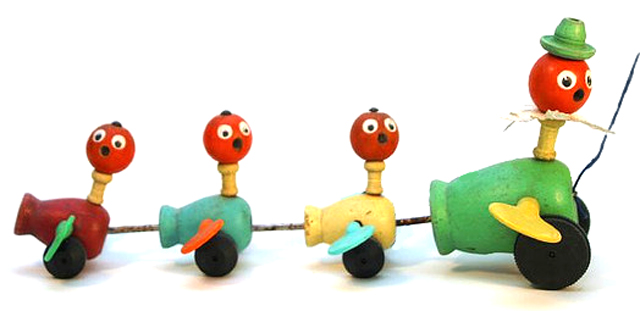Genesis 12:1-4a • Psalm 121
Romans 4:1-5, 13-17 • John 3:1-17
How Do Christians Know When to Trust?
 There is that part of human nature that leads us to question.
There is that part of human nature that leads us to question.
A great deal of religion revolves around two words: Trust and Obey.
In the wrong hands, reliance on trust and obedience can be disastrous.
It leads to cults like the Jim Jones group suicide a few decades ago. That’s the extreme example. Less extreme is the everyday tendency to trust church leaders for no other reason than they are church leaders. Abuse is inevitable and there are plenty of church scandals to prove it.
The reliance on trust and obedience may be the root of church decline. We pray. We trust. We fail to question and act.
Today’s scriptures juxtapose two key Bible figures that illustrate the extremes of trust and obey vs questioning what we hear. Finding the balance between trust and curiosity is an important concept for mature Christian faith.
Abraham
Early in biblical history, Abram (soon to be Abraham) trusted. God said “move.” He packed his camels and traipsed hundreds of miles from Ur to Canaan, through unknown territory occupied by all kinds of hostile strangers. Abram was a loyal follower.
He would display the same trust when God told him to sacrifice his favorite son, Isaac.
Things worked out pretty well for Abraham. His trust in God resulted in a long life and three major world religions.
A few thousand years passed between Abraham and Nicodemus. Things had changed. God sent Jesus to live among his people.
Nicodemus
Nicodemus had a front row seat for some of Jesus’ ministry. He was aware of Jesus’ and John the Baptist’s growing following. Jesus’ miracles had caught his attention. No doubt about it. God was involved.
Nicodemus was s pretty smart guy. A Pharisee. Educated. Rich. Influential. A religious and community leader.
He had accepted God’s ways for most of his life. He could quote scripture with the best of them. He was probably used to arguing Jewish law with colleagues. It was not hubris that made him seek Jesus out. He had good questions. But there was danger in the air.
Jesus wasn’t your everyday temple leader. He was attracting a lot of attention—some of it threatening. Nicodemus wasn’t about to risk his status in the community and perhaps his life to trust and obey this maverick.
Some things weren’t making sense. He wanted answers. He was not ready to trust and obey. Nicodemus needed to get Jesus alone.
Was he wrong? Was he a poor candidate for discipleship with Jesus? Should he simply accept—trust and obey?
What do these two very different stories teach us?
Today’s object is a paper bag or sack large enough to fit over an adult head—your head. Take a marker and draw a big question mark on the paper bag.
You are going to play both Abraham and Nicodemus.
Start talking about Abraham and his trust. Put the bag over your head and ask a congregation member, perhaps a youth, to lead you around the nave while you demonstrate obedience and trust. Plan this ahead of time and make sure you are led to a couple of pre-arranged spots.
At first, accept being led. Ask questions such as ”Where next?” “Are we there yet?’
But at some point start asking less trusting questions. “Haven’t we been here before?” “Why are you taking me here?” Stumble a bit and comment that this may not be such a good idea.
Start mimicking Nicodemus. “I know you are of God.”
Make sure one of the stops on your guided tour is the baptismal font. Here, you can address Nicodemus’s first question about being born again.
Stress Jesus’ answer:
“Very truly, I tell you, no one can enter the kingdom of God without being born of water and Spirit.”
This is a pivotal doctrinal verse. We have this verse because Nicodemus asked a good question.
You can stop at the pulpit and address Nicodemus’s second question and Jesus’s answer:
“Are you a teacher of Israel, and yet you do not understand these things? . . . .”
You might end your tour at the altar and cross.
Because Nicodemus questioned Jesus, we have the perhaps the most famous and foundational verse in the Bible.
John 3:16. It is so well-known that people make posters with just the reference on it.
“For God so loved the world that he gave his only Son, so that everyone who believes in him may not perish but may have eternal life.”
Nicodemus took big risks in questioning Jesus. He risked his safety. He risked his status. He risked feeling like a fool as he sat at the feet of the greatest teacher.
Take a minute to thank God for Nicodemus and his questioning ways. Face it, we were wondering some of the same things! The answers Nicodemus risked his life to ask are just as pivotal to the growth of Christianity as Abram’s trusting obedience was to the growth of Judaism.
photo credit: NoHoDamon via photopin cc
Related posts
Slideshow: Questioning God
———————————————————————————————
Please Consider Subscribing to 2×2
2x2virtualchurch adds a slideshow and object lesson to our library each week. There are nearly 100 in our collection. If you like our easy, interactive approach to teaching adult learners, please consider subscribing.
You will receive a weekly slideshow (which you can use on your church website or during worship), an object lesson and many other church planning ideas—all geared for small church use.
Slides are in editable form. Individual slides can be posted on websites or converted to jpgs for use in a bulletin or newsletter. (Please include appropriate credits.)
Thank you.
[jetpack_subscription_form]









